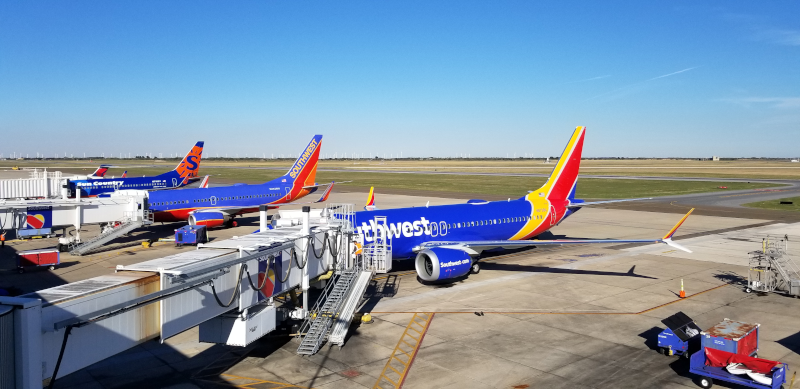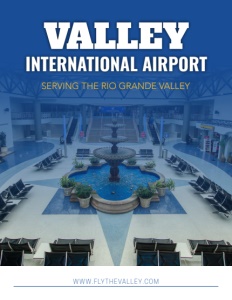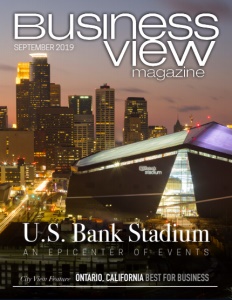Valley International Airport
Serving the Rio Grande Valley
Business View Magazine interviews Marv Esterly, Director of Aviation at the Valley International Airport as part of our focus on regional American airports.
Valley International Airport is a public use, commercial service airport located in the City of Harlingen, in Cameron County, Texas, in the center of the Rio Grande Valley (RGV). “Like many airports in the State of Texas, it started out as an Army airfield,” recounts Marv Esterly, Valley International’s Director of Aviation. “It was actually a gunnery school back in 1941. After World War II, it morphed into Harlingen Air Force Base. In 1964, it became surplus property and was picked up by the City of Harlingen, which assumed control of the Airport in 1967. In 1989, there was a ground breaking for the new terminal building. It was completed in 1991, and the Airport has never looked back.”
Operated by a nine-member board made up of local businessmen and women appointed by the mayor, Valley International Airport is self-sustaining, operating in the black, and without the support of any tax dollars from the city. “We’re also debt-free ever since the terminal building was paid for years ago,” says Esterly. “We’re really sitting in a great financial condition because we do have businessmen and women who sit on the board. We have about 54 employees; we have our own police force here, as well. The only things we contract with the city for are aircraft rescue and firefighting personnel. Other than that, everything is self-contained at the Airport.”

In fact, rather than spending the city’s money, the Airport’s economic impact on the Rio Grande Valley economy is considerable. According to a recent study conducted by the Aviation Division of the Texas Department of Transportation, the Valley International’s direct impact to the region consists of 518 jobs and an annual output of $96.2 million. With the addition of capital improvement and visitor impacts, the Airport provides a total of 4,540 jobs with a payroll of $148.1 million, and a $432.7 million impact on the local economy. “I don’t think there’s an airport that’s blowing up like Valley International in the last few years,” Esterly states.
And the numbers prove it. In 2018, Valley International had a total of 41,291 airfield operations and serviced 615,000 passengers. It hosts six commercial carriers: Southwest, United, American, and Frontier, with seasonal service from Delta and Sun Country, offering non-stop service to Houston, Austin, Dallas/Ft. Worth, Denver, Chicago, and Minneapolis. Depending on the day and season, it sees up to 18 daily airline departures. The Airport is also known as the “Gateway to South Padre Island,” one of the area’s most popular tourist destinations. In addition, Valley International is a major cargo hub, currently ranked 71st in the U.S., with approximately 60,000 tons transported annually by DHL Aviation, which has a freight facility, and FedEx Express, which operates a regional sort facility, there.

Valley International is also a general aviation airport serviced by two professional FBOs – Sun Valley Aviation and Gulf Aviation – with ample area available for new GA and corporate hangar development. “General aviation has been increasing here,” Esterly notes. “Our hangars are full and Sun Valley just constructed a new hangar for the storage of additional aircraft. So, it’s going in the right direction.”
With three commercial service airports operating in the Rio Grande Valley within a 40-mile radius, Esterly says that his facility competes rigorously for commercial traffic. “It’s kind of a cross-town rivalry,” he quips. However, he believes that Valley International has several advantages over its neighbors. “What’s unique about Valley International Airport is that it’s centrally located amongst the population centers in the Rio Grande Valley. If you draw that 40-mile range ring around our catchment area, it’s able to capture all the way to South Padre Island, Brownsville, and all of the communities between, as well as McAllen, Mission, and the Edinburg areas; it encompasses everything. When you go to the other two – to the south, which is Brownsville, and McAllen, which is to the west of the RGV – if you draw that same range ring around them, you’re not able to capture the entire Rio Grande Valley.”
Another advantage for Valley International is that it has three runways, as opposed to McAllen with one, as well as the longest runway in the Rio Grande Valley at 8,300 feet. “Not to mention, Valley International Airport has been very well-protected from encroachment,” Esterly adds. “At 2,600 acres, it’s got plenty of room to protect the environs around the Airport; it’s got overlay zoning in place; it’s the largest airport and has the largest amount of land for future expansion. That puts us at a competitive advantage.”
That being said, Esterly believes that having the three commercial airports within a 40-mile radius is rather unique, and not necessarily the best option for the future. “I don’t know of any other place in the United States that’s any closer than we are,” he surmises. “But maintaining three airports within such close proximity is a huge risk for any one community to make huge improvements to their airport. You don’t know, tomorrow, whether you’ll have airline service. Communities need to know that good air service is very, very important to their community, but not every city needs to have their own airport; they just need to have access to good air service. So, if you can improve your air service in the region by consolidation, it makes a lot of sense. So, the citizens and community leaders need to think about that as we move forward.”

Meanwhile, another potential advantage at Valley International is the initial creation of the Harlingen Aerotropolis – 480 acres of shovel-ready land for both aeronautical and non-aeronautical development. The objective of the Aerotropolis is to attract international corporations, logistics companies, and others that would benefit from its strategic location, minutes from the U.S./Mexico border. Once completed, the Harlingen Aerotropolis will consist of several development districts that are intended to be compatible with one another. “We’re looking for developers and businesses,” says Esterly. “They have access to the Airport if they need it, and if they don’t, there’s plenty of land with access directly into Mexico.”
Among the future projects on Esterly’s list for the main airfield is a 1,100-foot addition to its 8,300-ft. runway. “That’s being driven by the immense amount of cargo going out of the area from trade across the Mexico border, as well as all the online business,” he explains. “FedEx flies two flights a day to Memphis with wide-body aircraft, and you’ve got DHL out of Monterey, Mexico that stops here and collects cargo and goes on. So lots of cargo is driving that runway expansion.”
“We also have a project to overlay one of our air carrier runways – 13/31,” he adds. “That’s scheduled for next year, and there are some other terminal projects. We’ve done so much over the last few years inside the terminal building – replacing air handling units and sprucing up the place to make sure we retain our title as the premier airport of the Rio Grande Valley.” Other recent projects included modernizing the Airport’s ARFF facility; street, ramp, and parking light retrofits with LEDs; reconfiguration, reconstruction, and/or rehabilitation of taxiways; air carrier apron reconstruction; and the installation of an approach lighting system on runway 31.
Going forward, Esterly’s strategy for success is clear-cut: control the tenants’ operating costs by diversifying revenue streams; and providing premier customer service to the Airport’s patrons “from curb to plane and beyond.”
AT A GLANCE
WHO: Valley International Airport
WHAT: A public use, commercial service airport
WHERE: In the City of Harlingen, in Cameron County, Texas
WEBSITE: www.flythevalley.com
PREFERRED VENDORS
South Padre Island – www.sopadre.com
So Motivating. So Padre.
With 34 miles of pristine shoreline, year-round perfect weather, and a lively dining and nightlife scene, South Padre Island is a popular destination for travelers seeking a tropical getaway. But the sun, surf, and sand aren’t just reserved for vacationers. South Padre Island offers all the essentials for hosting an event that will inform, inspire and improve your sense of camaraderie, both in and out of the boardroom. From sandcastle building lessons to horseback riding on the beach, the Island offers a variety of experiences that are motivating and personalized.
Delightfully mild temperatures and warm, calm water make any time of the year ideal for planning. Plus, the Island offers lodging tailored to fit all styles and budgets, from rental condominiums and beach homes to full-service resort hotels and motels. Learn more at SoPadre.com.
Marine Military Academy – mma-tx.org
Marine Military Academy is a college-preparatory boarding school for young men in grades 7-12 with an optional post-graduate year. Located in sunny South Texas, MMA is the only private school based on the traditions, values and ideals of the U.S. Marine Corps. Since 1965, MMA has been home to boys from all over the world. MMA takes young men and fuels their mind, body and spirit.











